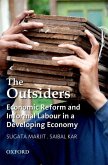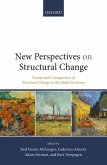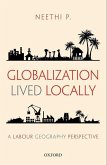Tasks, Skills, and Institutions
The Changing Nature of Work and Inequality
Herausgeber: Gradín, Carlos; Sen, Kunal; Schotte, Simone; Lewandowski, Piotr
Tasks, Skills, and Institutions
The Changing Nature of Work and Inequality
Herausgeber: Gradín, Carlos; Sen, Kunal; Schotte, Simone; Lewandowski, Piotr
- Gebundenes Buch
- Merkliste
- Auf die Merkliste
- Bewerten Bewerten
- Teilen
- Produkt teilen
- Produkterinnerung
- Produkterinnerung
The book investigates the trends in earnings inequalities in developing countries to determine the main drivers.
Andere Kunden interessierten sich auch für
![The Digital Continent The Digital Continent]() Mohammad Amir AnwarThe Digital Continent126,99 €
Mohammad Amir AnwarThe Digital Continent126,99 €![Kazakhstan 2050 Kazakhstan 2050]() Kazakhstan 2050121,99 €
Kazakhstan 2050121,99 €![The Outsiders The Outsiders]() Sugata MarjitThe Outsiders69,99 €
Sugata MarjitThe Outsiders69,99 €![New Perspectives on Structural Change New Perspectives on Structural Change]() New Perspectives on Structural Change183,99 €
New Perspectives on Structural Change183,99 €![Work and Pay in 20th Century Britain Work and Pay in 20th Century Britain]() Nicholas Crafts / Ian Gazeley / Andrew Newell (eds.)Work and Pay in 20th Century Britain78,99 €
Nicholas Crafts / Ian Gazeley / Andrew Newell (eds.)Work and Pay in 20th Century Britain78,99 €![Miracle to Meltdown in Asia Miracle to Meltdown in Asia]() Norman FlynnMiracle to Meltdown in Asia273,99 €
Norman FlynnMiracle to Meltdown in Asia273,99 €![Globalization Lived Locally Globalization Lived Locally]() Neethi PGlobalization Lived Locally98,99 €
Neethi PGlobalization Lived Locally98,99 €-
-
-
The book investigates the trends in earnings inequalities in developing countries to determine the main drivers.
Hinweis: Dieser Artikel kann nur an eine deutsche Lieferadresse ausgeliefert werden.
Hinweis: Dieser Artikel kann nur an eine deutsche Lieferadresse ausgeliefert werden.
Produktdetails
- Produktdetails
- Verlag: Hurst & Co.
- Seitenzahl: 336
- Erscheinungstermin: 22. September 2023
- Englisch
- Abmessung: 235mm x 164mm x 24mm
- Gewicht: 676g
- ISBN-13: 9780192872241
- ISBN-10: 0192872249
- Artikelnr.: 67865433
- Herstellerkennzeichnung
- Libri GmbH
- Europaallee 1
- 36244 Bad Hersfeld
- gpsr@libri.de
- Verlag: Hurst & Co.
- Seitenzahl: 336
- Erscheinungstermin: 22. September 2023
- Englisch
- Abmessung: 235mm x 164mm x 24mm
- Gewicht: 676g
- ISBN-13: 9780192872241
- ISBN-10: 0192872249
- Artikelnr.: 67865433
- Herstellerkennzeichnung
- Libri GmbH
- Europaallee 1
- 36244 Bad Hersfeld
- gpsr@libri.de
Carlos Gradín holds a PhD in economics (Autonomous University of Barcelona, 1999). He is Professor of Applied Economics at the University of Vigo, Spain, and has been a Research Fellow at UNU-WIDER, Helsinki, Finland. His main research interests are poverty, inequality, and discrimination. He is especially interested in inequalities between population groups and deals with enhancing the empirical evidence as well as methodological tools for the measurement and understanding of those issues. Piotr Lewandowski is a labour economist, a President of the Board at the Institute for Structural Research (IBS), Warsaw, Poland, and a Research Fellow at the IZA, Bonn, and RWI Essen, Germany. His research interests include the impact of technology on labour markets, structural and occupational change, job quality, minimum wage, energy poverty, and the labour market effects of climate and energy policies. Simone Schotte is a development economist focusing on inequality, social stratification, and labour markets research. She is a Project Director at Finnish Overseas Consultants (FinnOC) and has been a Research Associate at UNU-WIDER as well as a consultant to the World Bank. She holds a PhD from the University of Göttingen and her research has been published in journals such as World Development, Journal of Economic Inequality, Journal of Development Studies, Kyklos, International Migration Review, among others. Kunal Sen is Director of UNU-WIDER, Helsinki, Finland, and Professor of Development Economics, Global Development Institute, University of Manchester, UK (on leave). He has over three decades of experience in academic and applied development economics research. He has performed extensive research on the political economy of growth and development, international finance, the dynamics of poverty, social exclusion, female labour force participation, and the informal sector in developing economies. His research has focused on India, East Asia, and sub-Saharan Africa. He was awarded the Sanjaya Lall Prize in 2006 and the Dudley Seers Prize in 2003 for his publications.
* Part One: Introduction
* Chapter 1 Introduction: the changing nature of work and inequality
by Carlos Gradín, Piotr Lewandowski, Simone Schotte, and Kunal Sen
* Chapter 2 Data and methodology by Carlos Gradín, Piotr Lewandowski,
Simone Schotte, and Kunal Sen
* Part Two: Cross-country analysis
* Chapter 3 Global divergence in the de-routinization of jobs by Piotr
Lewandowski, Albert Park, and Simone Schotte
* Chapter 4 Cross-country patterns in structural transformation and
inequality in developing countries by Carlos Gradín, Piotr
Lewandowski, Simone Schotte, and Kunal Sen
* Part Three: Country Studies
* Chapter 5 Ghana: employment and inequality trends by Carlos Gradín
and Simone Schotte
* Chapter 6 South Africa: employment and inequality trends by Haroon
Bhorat, Kezia Lilenstein, Morné Oosthuizen, and Amy Thornton
* Chapter 7 Tunisia: employment and inequality trends by Minh-Phuong
Le, Mohamed Ali Marouani, and Michelle Marshalian
* Chapter 8 Bangladesh: employment and inequality trends by Sayema
Haque Bidisha, Tanveer Mahmood, and Mahir A. Rahman
* Chapter 9 China: employment and inequality trends by Chunbing Xing
* Chapter 10 India: employment and inequality trends by Saloni Khurana
and Kanika Mahajan
* Chapter 11 Indonesia: employment and inequality trends by Arief
Anshory Yusuf and Putri Riswani Halim
* Chapter 12 Argentina: employment and inequality trends by Roxana
Maurizio and Ana Paula Monsalvo
* Chapter 13 Brazil: employment and inequality trends by Sergio Firpo,
Alysson Portella, Flavio Riva, and Giovanna Úbida
* Chapter 14 Chile: employment and inequality trends by Gabriela
Zapata-Román
* Chapter 15 Peru: employment and inequality trends by Jorge Dávalos
and Paola Ballon
* Part Four: Conclusions
* Chapter 16 Conclusions and policy implications by Carlos Gradín,
Piotr Lewandowski, Simone Schotte, and Kunal Sen
* Chapter 1 Introduction: the changing nature of work and inequality
by Carlos Gradín, Piotr Lewandowski, Simone Schotte, and Kunal Sen
* Chapter 2 Data and methodology by Carlos Gradín, Piotr Lewandowski,
Simone Schotte, and Kunal Sen
* Part Two: Cross-country analysis
* Chapter 3 Global divergence in the de-routinization of jobs by Piotr
Lewandowski, Albert Park, and Simone Schotte
* Chapter 4 Cross-country patterns in structural transformation and
inequality in developing countries by Carlos Gradín, Piotr
Lewandowski, Simone Schotte, and Kunal Sen
* Part Three: Country Studies
* Chapter 5 Ghana: employment and inequality trends by Carlos Gradín
and Simone Schotte
* Chapter 6 South Africa: employment and inequality trends by Haroon
Bhorat, Kezia Lilenstein, Morné Oosthuizen, and Amy Thornton
* Chapter 7 Tunisia: employment and inequality trends by Minh-Phuong
Le, Mohamed Ali Marouani, and Michelle Marshalian
* Chapter 8 Bangladesh: employment and inequality trends by Sayema
Haque Bidisha, Tanveer Mahmood, and Mahir A. Rahman
* Chapter 9 China: employment and inequality trends by Chunbing Xing
* Chapter 10 India: employment and inequality trends by Saloni Khurana
and Kanika Mahajan
* Chapter 11 Indonesia: employment and inequality trends by Arief
Anshory Yusuf and Putri Riswani Halim
* Chapter 12 Argentina: employment and inequality trends by Roxana
Maurizio and Ana Paula Monsalvo
* Chapter 13 Brazil: employment and inequality trends by Sergio Firpo,
Alysson Portella, Flavio Riva, and Giovanna Úbida
* Chapter 14 Chile: employment and inequality trends by Gabriela
Zapata-Román
* Chapter 15 Peru: employment and inequality trends by Jorge Dávalos
and Paola Ballon
* Part Four: Conclusions
* Chapter 16 Conclusions and policy implications by Carlos Gradín,
Piotr Lewandowski, Simone Schotte, and Kunal Sen
* Part One: Introduction
* Chapter 1 Introduction: the changing nature of work and inequality
by Carlos Gradín, Piotr Lewandowski, Simone Schotte, and Kunal Sen
* Chapter 2 Data and methodology by Carlos Gradín, Piotr Lewandowski,
Simone Schotte, and Kunal Sen
* Part Two: Cross-country analysis
* Chapter 3 Global divergence in the de-routinization of jobs by Piotr
Lewandowski, Albert Park, and Simone Schotte
* Chapter 4 Cross-country patterns in structural transformation and
inequality in developing countries by Carlos Gradín, Piotr
Lewandowski, Simone Schotte, and Kunal Sen
* Part Three: Country Studies
* Chapter 5 Ghana: employment and inequality trends by Carlos Gradín
and Simone Schotte
* Chapter 6 South Africa: employment and inequality trends by Haroon
Bhorat, Kezia Lilenstein, Morné Oosthuizen, and Amy Thornton
* Chapter 7 Tunisia: employment and inequality trends by Minh-Phuong
Le, Mohamed Ali Marouani, and Michelle Marshalian
* Chapter 8 Bangladesh: employment and inequality trends by Sayema
Haque Bidisha, Tanveer Mahmood, and Mahir A. Rahman
* Chapter 9 China: employment and inequality trends by Chunbing Xing
* Chapter 10 India: employment and inequality trends by Saloni Khurana
and Kanika Mahajan
* Chapter 11 Indonesia: employment and inequality trends by Arief
Anshory Yusuf and Putri Riswani Halim
* Chapter 12 Argentina: employment and inequality trends by Roxana
Maurizio and Ana Paula Monsalvo
* Chapter 13 Brazil: employment and inequality trends by Sergio Firpo,
Alysson Portella, Flavio Riva, and Giovanna Úbida
* Chapter 14 Chile: employment and inequality trends by Gabriela
Zapata-Román
* Chapter 15 Peru: employment and inequality trends by Jorge Dávalos
and Paola Ballon
* Part Four: Conclusions
* Chapter 16 Conclusions and policy implications by Carlos Gradín,
Piotr Lewandowski, Simone Schotte, and Kunal Sen
* Chapter 1 Introduction: the changing nature of work and inequality
by Carlos Gradín, Piotr Lewandowski, Simone Schotte, and Kunal Sen
* Chapter 2 Data and methodology by Carlos Gradín, Piotr Lewandowski,
Simone Schotte, and Kunal Sen
* Part Two: Cross-country analysis
* Chapter 3 Global divergence in the de-routinization of jobs by Piotr
Lewandowski, Albert Park, and Simone Schotte
* Chapter 4 Cross-country patterns in structural transformation and
inequality in developing countries by Carlos Gradín, Piotr
Lewandowski, Simone Schotte, and Kunal Sen
* Part Three: Country Studies
* Chapter 5 Ghana: employment and inequality trends by Carlos Gradín
and Simone Schotte
* Chapter 6 South Africa: employment and inequality trends by Haroon
Bhorat, Kezia Lilenstein, Morné Oosthuizen, and Amy Thornton
* Chapter 7 Tunisia: employment and inequality trends by Minh-Phuong
Le, Mohamed Ali Marouani, and Michelle Marshalian
* Chapter 8 Bangladesh: employment and inequality trends by Sayema
Haque Bidisha, Tanveer Mahmood, and Mahir A. Rahman
* Chapter 9 China: employment and inequality trends by Chunbing Xing
* Chapter 10 India: employment and inequality trends by Saloni Khurana
and Kanika Mahajan
* Chapter 11 Indonesia: employment and inequality trends by Arief
Anshory Yusuf and Putri Riswani Halim
* Chapter 12 Argentina: employment and inequality trends by Roxana
Maurizio and Ana Paula Monsalvo
* Chapter 13 Brazil: employment and inequality trends by Sergio Firpo,
Alysson Portella, Flavio Riva, and Giovanna Úbida
* Chapter 14 Chile: employment and inequality trends by Gabriela
Zapata-Román
* Chapter 15 Peru: employment and inequality trends by Jorge Dávalos
and Paola Ballon
* Part Four: Conclusions
* Chapter 16 Conclusions and policy implications by Carlos Gradín,
Piotr Lewandowski, Simone Schotte, and Kunal Sen








